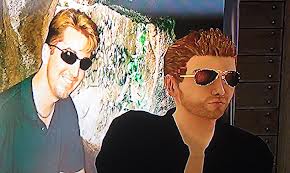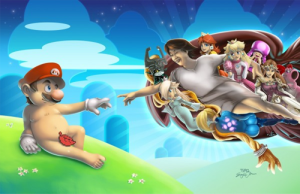The Essence of (Virtual) Life
by ted2112, HSM team writer
Throughout our history we have been fascinated by the concept of the essence of life. Many books, movies and video games explore the concept of creating life. This truly is a fascinating concept and if you think about it, it’s something we may be doing in a virtual sense every day in Home.
Perhaps it was Mary Shelly’s book Frankenstein, written in 1818, that brought it to our collective consciousness. Since then, all the spin-off books and movies still use the idea of using rudimentary organic and physical parts of a human body to build life. This build a body and life will fill it up concept of the 1800’s was driven by the technology of the day. . Electricity was a big deal then, and the newly discovered theory of Galvanism was really shaking up scientific circles. So, perhaps Frankenstein may have been a kind of rudimentary avatar. Today the idea has morphed a bit with zombie movies like I am Legend, Shock Waves and Night of the Living Dead. Today’s video games like Resident Evil, Burn Zombie Burn and Dead Island offer the same themes. We live in a very different time, yet still explore the same 1800’s concept of organic life reanimated into something different.
Yet, this is the exact opposite of the themes of much modern fiction. Today’s dominant theme is, build intelligence and life will fill it up. Look at video games such Final Fantasy and movie icons like the Terminator, Hal-9000, Blade Runner’s replicants or even television’s Cylons of Battlestar Galactica. These are all examples of mechanical intelligence that evolved into some kind of life even if it doesn’t look like us.
If you look up the definition of life, it’s not a cut and dry concept.
Webster’s definition on the word is lengthy and sometimes contradictory, meaning we’re not totally sure. My favorite one however is: “the sequence of physical and mental experiences that make up the existence of an individual.” Yup, simple as that. And, using that idea, there is a lot of life, even if it’s virtual in Home.
 I know our Avatars aren’t real, or at least I don’t think they are. Check out Death after Life by NorseGamer for a really interesting look at the lives of our avatars on Home. In this great work of fiction, Norse proposes an “if a tree falls in the woods and no one is there to see it, does it make a noise” argument about our very own Home avatars, and what they do after we are done with them. The really great thing about “Death after Life” other than the wonderfully unique story, is Norse just may be correct because there is really no way to prove it right or wrong, and that idea of making you think about it, in a nutshell is great storytelling.
I know our Avatars aren’t real, or at least I don’t think they are. Check out Death after Life by NorseGamer for a really interesting look at the lives of our avatars on Home. In this great work of fiction, Norse proposes an “if a tree falls in the woods and no one is there to see it, does it make a noise” argument about our very own Home avatars, and what they do after we are done with them. The really great thing about “Death after Life” other than the wonderfully unique story, is Norse just may be correct because there is really no way to prove it right or wrong, and that idea of making you think about it, in a nutshell is great storytelling.
My avatar is organic in a way. All the “stuff”, as Carl Sagan was fond of saying, exists and is therefore organic. As early as the 1980’s we didn’t know about Chemosynthesis — an entire way of producing life, totally removed from traditional thinking. This was completely the stuff of science fiction just twenty years ago, and who’s to say that won’t happen time and time again? If I create my avatar,and elicit a emotional response from a real organic person, does that make Webster’s definition ring true, and does my avatar have life? Or, is virtual reality a simply extension of myself? Ether way there is the idea of life involved.
I feel we will be asking these questions in one way or another for a very long time to come. All I know is this riddle of technology is mashed up in our collective consciousness and consistently makes its way to the popular media of the time in which it’s asked. Today is no different. Like Mary Shelly’s Frankenstein, we want to know if we create life, virtual or not, in what way are we responsible for it? If we can program Mario to think, will he therefore be?
 Being a gamer is to know about the experiences of life. We live an interactive story that unfolds before our feet. In many ways, the experience of living a game is more profound than that of simply reading a book because it is we who determine the life and consequences of our characters or avatars.
Being a gamer is to know about the experiences of life. We live an interactive story that unfolds before our feet. In many ways, the experience of living a game is more profound than that of simply reading a book because it is we who determine the life and consequences of our characters or avatars.
This has even become more intense since the advent of the on-line game. Now this story of life can be woven and shared by another. Just look at Home — an entire society has sprung up from the silicon ether, and who is to say it’s not life?
Share
| Tweet |



 Twitter
Twitter
GAAHH! You’re twistin’ mah mellon again maaaan! LOL! Love it Ted, love it!
I had a friend watch me using Home once, he kept asking me “are those other things REAL people!?” as if, maybe the next time he asked the question he’d get a different answer, one he could understand.
A.I has always been something we’ve wanted to create at a human level for decades, I’m not 100% sure why though. Like Blade Runner’s clones, how would we justify treating them equally -- WOULD we!?
As humans we have a habit of putting life and character into even inanimate objects, and we do it naturally, at a very young age. In Home we embody our doppelgangers or our alternates, and react to situations based on the visual cue they give us. But role-playing then becomes something entirely different. Would (could!?) A.I manage such a thing? Maybe time will tell, and when that comes, we can ask Dolly 5.1 if she really is dreaming of electric farmers…
I can agree it’s part of life but it’s like anything it’s ok in the correct proportions. Movies and books cleverly put products in place so you go out and buy them. Online MMOs rely on more addictive elements like social responsibilities, the need to be as good as you can and mundane tasks to achieve limited rewards. Take the recent granzella event, to play it is great to be top of leader board after 2 weeks you would have to put your life on hold for 2 weeks to win a limited reward. That’s where the problems lie because they try to get you addicted but you could lose the thing they are trying to get you addicted to away at any point. If you got true friends on home make sure you have multiple ways to contact them. I witnessed the panic of a loss of a friend during the psn outage. We have all probably witnessed people’s blurred reality with online relationships. It is life with real people but to others it’s a game to played with. Watch the trolling home vids on you tube
Great read Ted as always. Games have always been an extension of our “real” selves in a way, especially for those of us who love and play RPG games. When you are playing in Skyrim or any game that allows yo to create your character from scratch, like Home, you are adding a piece of yourself into it, how could you not as you are literally “creating” the avatar. As such it is us and we are it so the lines of reality get blurred a bit, at least they do if you are in Home for the right reasons and not just to play around with other peoples feelings and lives.
Since we put a piece of ourselves in each avatar we create they do take on life in a way, though not one that will usually effect our real one much, unless of course we fall in love. That is true in both real and virtual life, and that is what makes Home or any social MMO different from traditional “games”.
I agree that Home is an extension of our real selves. I created an avitar and i feel she looks alot like a younger version of me. I also gave her a thinner body, like my dream body. LOL. I designed her to be the me i wanted to be. I have made friendships that are very real to me and without these virtual worlds like Home and others, i would have never met these wonderful people I call friends. Great read!
Novels, movies, music, comic books, virtual worlds, children playing cops & robbers or dress up, all can bring our thoughts into another world at least for a short team.
However, it’s when we enter the world of make believe and don’t come back that we’re in trouble.
I’ve decided no put aside my dreams of being a programmer and instead I’ll buy some crayons and create a comic book super hero.
Oh forget it.
It’s time not team and to put aside my dreams not no put aside my dreams.
I’m not gonna’ do none of that stuff. I’m just gonna’ play and I ain’t coming back till I have to sleep.